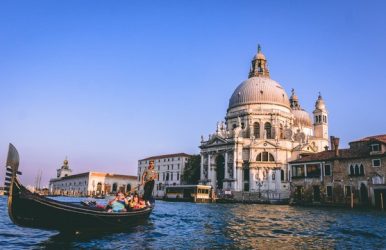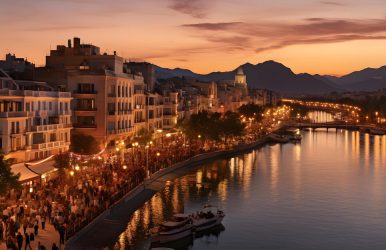10 Tips for Traveling Across Europe
BY Abdul Aziz Feb 20, 2021
Europe is a jewel of a continent. From the west to the east, no country is the same as the last, with each nation having its own unique customs, architecture, and must-see attractions. Traveling across Europe is fairly easy thanks to the fact the vast majority of it is landlocked, meaning it’s common for people to travel across the continent on an extended break rather than simply visiting one country and then coming back to visit another the following year. Whilst traveling from country to the country might seem effortless, there are a number of things you need to be aware of. When traveling to somewhere in Europe such as Ireland, make sure to book a reputable airport transfer company in advance. If you’re thinking of traveling across Europe, make sure you keep these 10 tips in mind before your trip commences. 1. Currency Changes: Time zone changes are a given, but currency changes aren’t. You’d be forgiven for thinking that most European countries use the Euro, but they don’t. Not every country on the continent of Europe is in the EU (such as the UK, Norway, and Turkey). Regardless of whether a country is the European Union, that doesn’t necessarily mean they’re going to use the Euro. Such countries include: Bulgaria Croatia Czech Republic Denmark Hungary Poland Romania Sweden It’s always worth keeping Euro with you as some countries that don’t normally use the Euro will accept it as a form of payment, but you should be mindful of the currency of the countries you’re going to be visiting and make a note of the exchange rates. For instance, if you are visiting Romania for business purposes or are willing to start a business in Romania, you should be aware of the currency factors. Also, it's better to understand what form of registration is more applicable in that geographic area. As far as Romania businessmen are concerned, they always go for the PFA registration process instead of SA or SRL. Why? PFA is simple and low-cost! 2. Opening Hours (Siestas) Depending on where you’re from and where you’re going, you’ll likely encounter different opening hours to what you’re used to. This mainly applies to hot countries like Spain where it’s traditional for the locals to take a siesta during the hottest part of the day. This results in many businesses closing at noon for two hours. In tourist hotspots and resort areas, this might not be the case as businesses attempt to maximize profits, but in hidden gem areas that are off the beaten track, it’s more likely that this long-term tradition will be adhered to. So, you need to make sure you’re aware of closing times and societal opening hours before you’re caught short and in need of urgent supplies but can’t get any. 3. Temperature Changes: Europe is a very varied continent that spans over 1,339 miles from the east to the west and 2,076 miles from north to south. Whilst it’s one of the smallest continents on Earth, it encompasses sub-arctic and desert landscapes all in one. If you’re planning on traveling from the west to the east, or the north to the south, you’re likely to experience all of these temperatures during your trip, so you need to pack accordingly. Whilst you might be okay wearing shorts, a t-shirt, and sandals in Rome, you will most definitely want sturdy boots, wooly mittens, and a big parka coat by the time you get to Russia. The last thing you want is to freeze (or melt) and have to spend a fortune on a new wardrobe for every country you visit. 4. Pack Light: We’ve just said to pack for every eventuality, but in the same breath, pack light. Europe is full of narrow streets, winding roads, and dainty amenities, and that can make lugging two 20kg suitcases extremely difficult. You’re more than likely going to be taking several types of transport and constantly be moving from place to place, so the last thing you want is to pack up your entire life every other week and drag it along some impractically small cobbled streets. Instead, take two of everything, with enough fresh underwear to last a week. That means two jumpers, two pairs of jeans, two skirts/shorts, two dresses, etc. There will be plenty of launderettes around to wash your clothes for you, and whilst going to the launderette every week might not sound too pleasant, neither does dragging your whole wardrobe down the winding, single file, cobbled streets of Greece. 5. Travel By Ground: Europe is – mostly – a landlocked mass (with the exception of some islands and parts of Scandinavia). Europeans also rely heavily on trains to get to and from places, and this means the countries are typically well connected by railway lines. If you’re planning to travel across Europe, do so by train as much as you can. It’s cheap, it’s fast and it gives you the chance to take in much more of the natural beauty the continent is home to. If you’re going to be traveling to islands like the UK and those in the Mediterranean, ferries are an option that is still often cheaper than flying. When it comes to getting to hard-to-reach locations, taxis are your friend. Whether you opt for Uber or an independent company like Place2Place, taxis are rife in Europe and easy enough to hail down. Once you get to your destination, you may wish to rent a car with the help of a site like StressFreeCarRental to give you the freedom to explore the island at your own pace and go exactly where it is you would like to. 6. Comfortable Shoes: As mentioned, Europe is home to many narrow streets, cobbled roads, and elevated inclinations. There’s a LOT of walking to be done, so make sure you pack a comfy pair of trainers or flats because this is one continent where – no matter where you are – you won’t be able to appreciate it in a pair of heels. 7. Reservations: Most of Europe is flooded by tourists at any given time of the year which results in almost every restaurant being rammed almost all of the time. If you’re a spontaneous diner, you’ll need to change your ways – and fast. Europeans work on a basis of reservations. You might even need to reserve a seat in a bar because it gets so busy! Make sure to call up a day in advance to book your place, otherwise, you’ll find yourself eating a McDonald’s instead of a traditional local delicacy, and that would be a complete waste of a trip. 8. Tap Water: Depending on where you go, tap water in Europe varies, so it’s best to stay away from it. Bottled water is incredibly destructive to the environment, but tap water in Europe could be incredibly destructive to your digestive system, so it’s all about weighing up the risks. By this, we mean the number of minerals in the water can change drastically which could cause nausea or diarrhea. It’s important to remember the tap water in Europe is perfectly safe to drink and is strictly monitored, but it can vary from place to place which means your stomach could get a little upset by it. This is something to keep in mind. 9. Food Tourist Traps: Earlier we mentioned making reservations, but it’s also important to note to avoid food tourist traps. Major attractions will be dotted with eateries and coffee shops, and whilst they’re practical, they’re also double the price and half the quality of other local places. Venture just a bit further out and you’ll find some beautiful places full of local delicacies that are much better prepared and much more reasonably priced. 10. Flight Compensation (EC 261): In the event you do travel by air across Europe, the good news is, you’re covered by EC 261 which is a flight compensation scheme. If your flight is delayed by three hours or more, is canceled or if you’re denied boarding, you’re entitled to compensation and the airline must provide accommodation where necessary. This applies to all flights taking off or landing in European countries, regardless of if the airline does not belong to an EU member state. This is a nice little bit of protection should things take a turn for the worst. If you are looking for great day tour options, then booking someone like Collins Day Tours is a great idea. These are just 10 tips for traveling across Europe, but the biggest tip of all is to HAVE FUN! Read Also: Top 5 Romantic European City Breaks 5 European Destinations Negatively Impacted By ‘Over-Tourism Top 3 Party Destinations For Safety-Conscious Tourists











